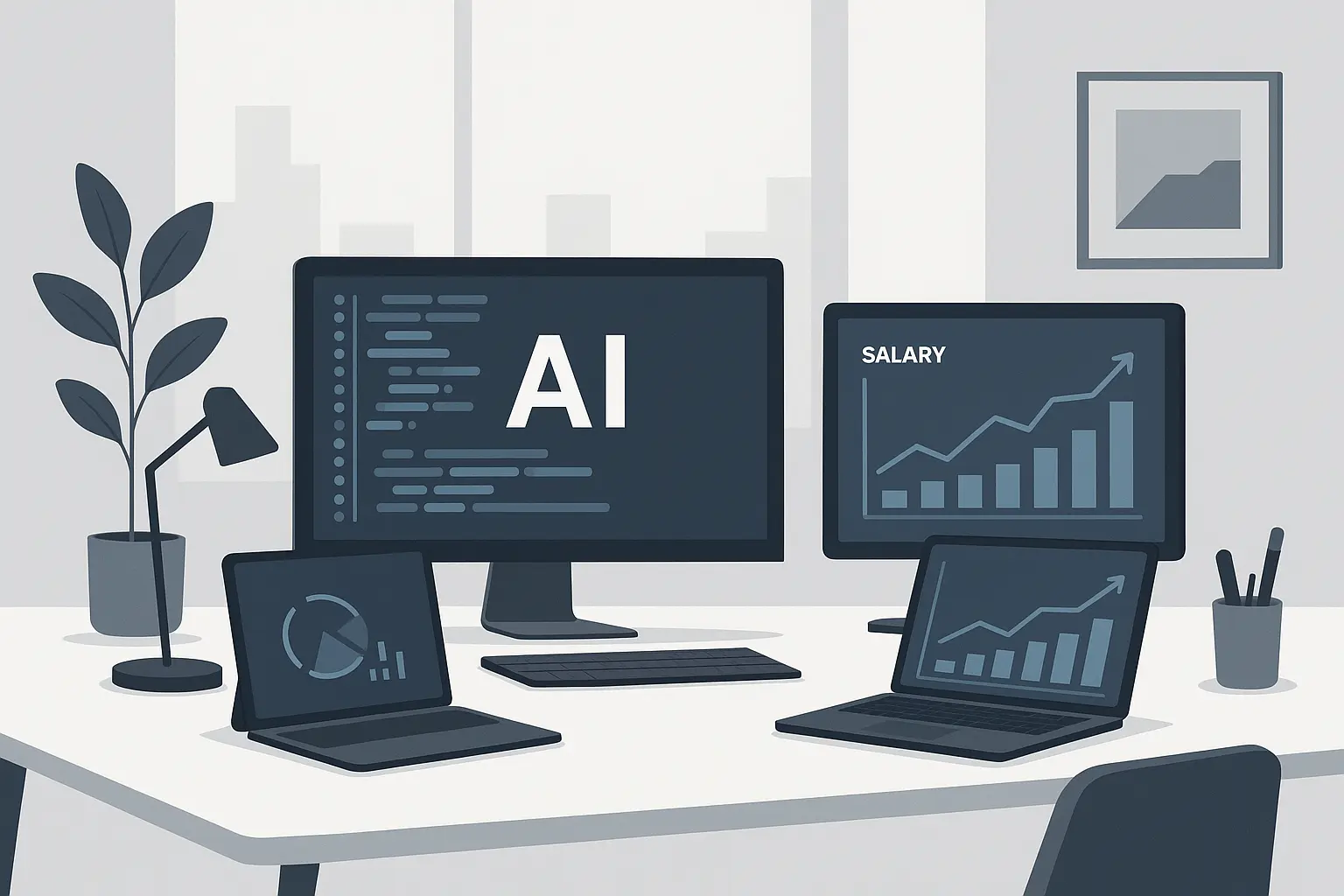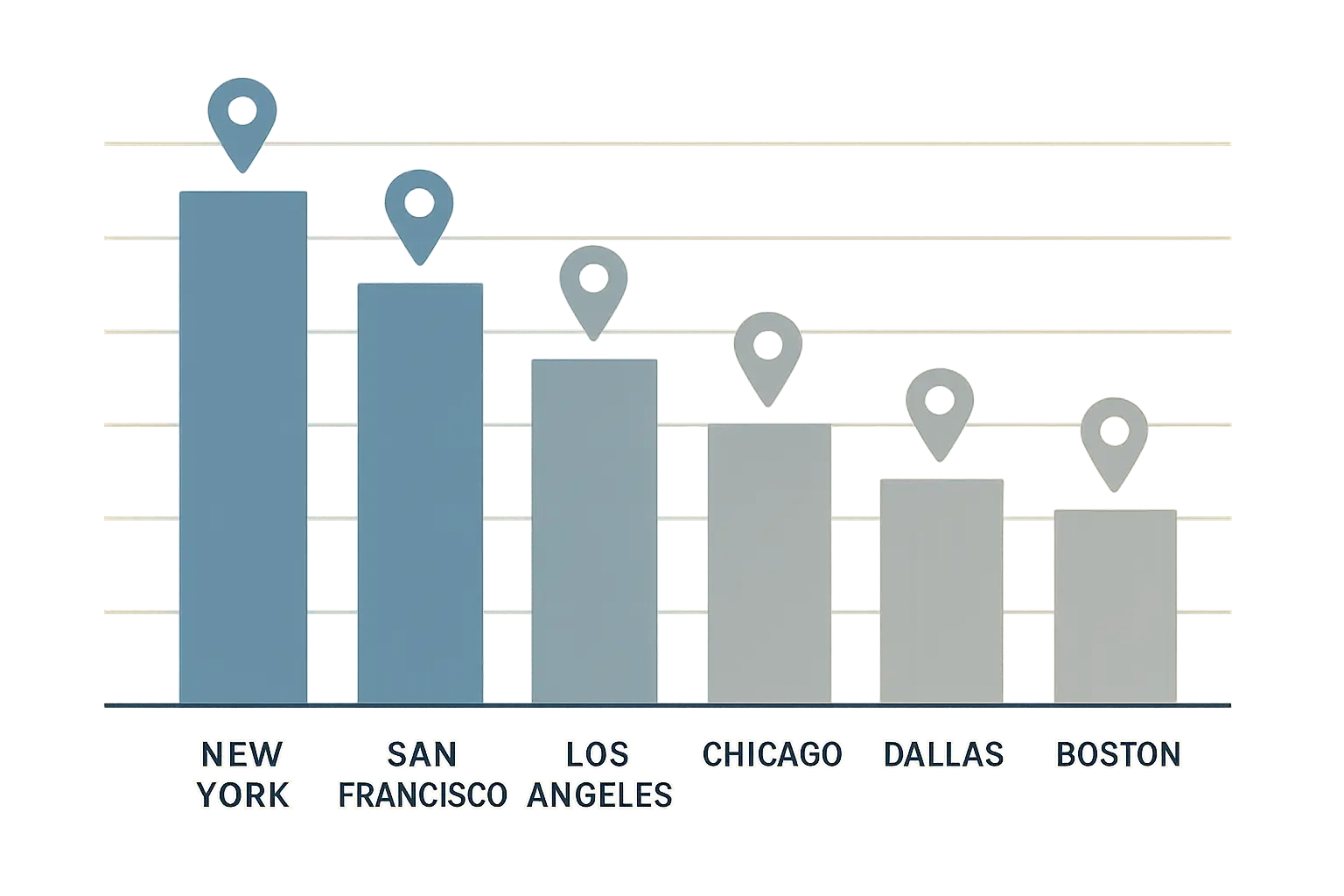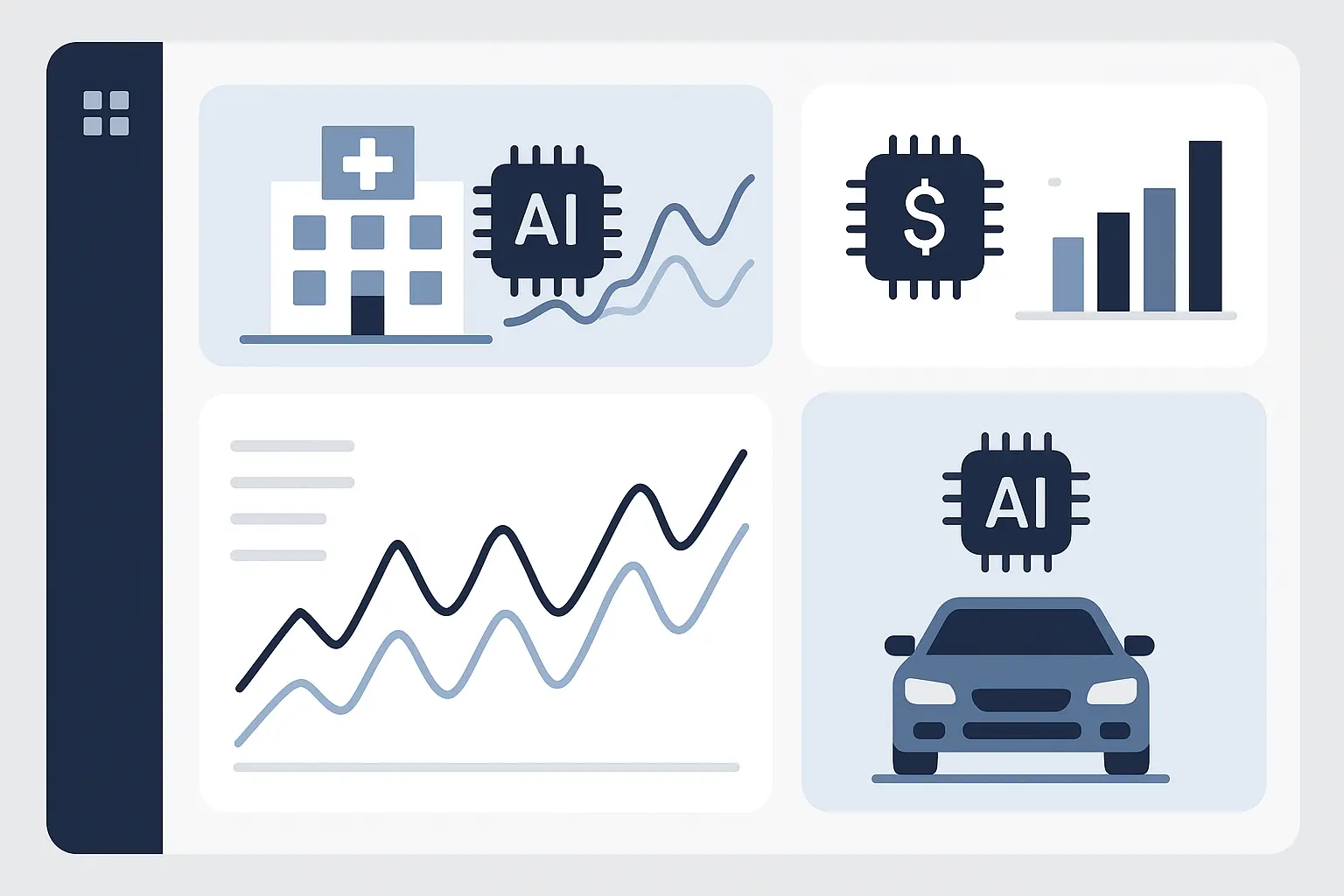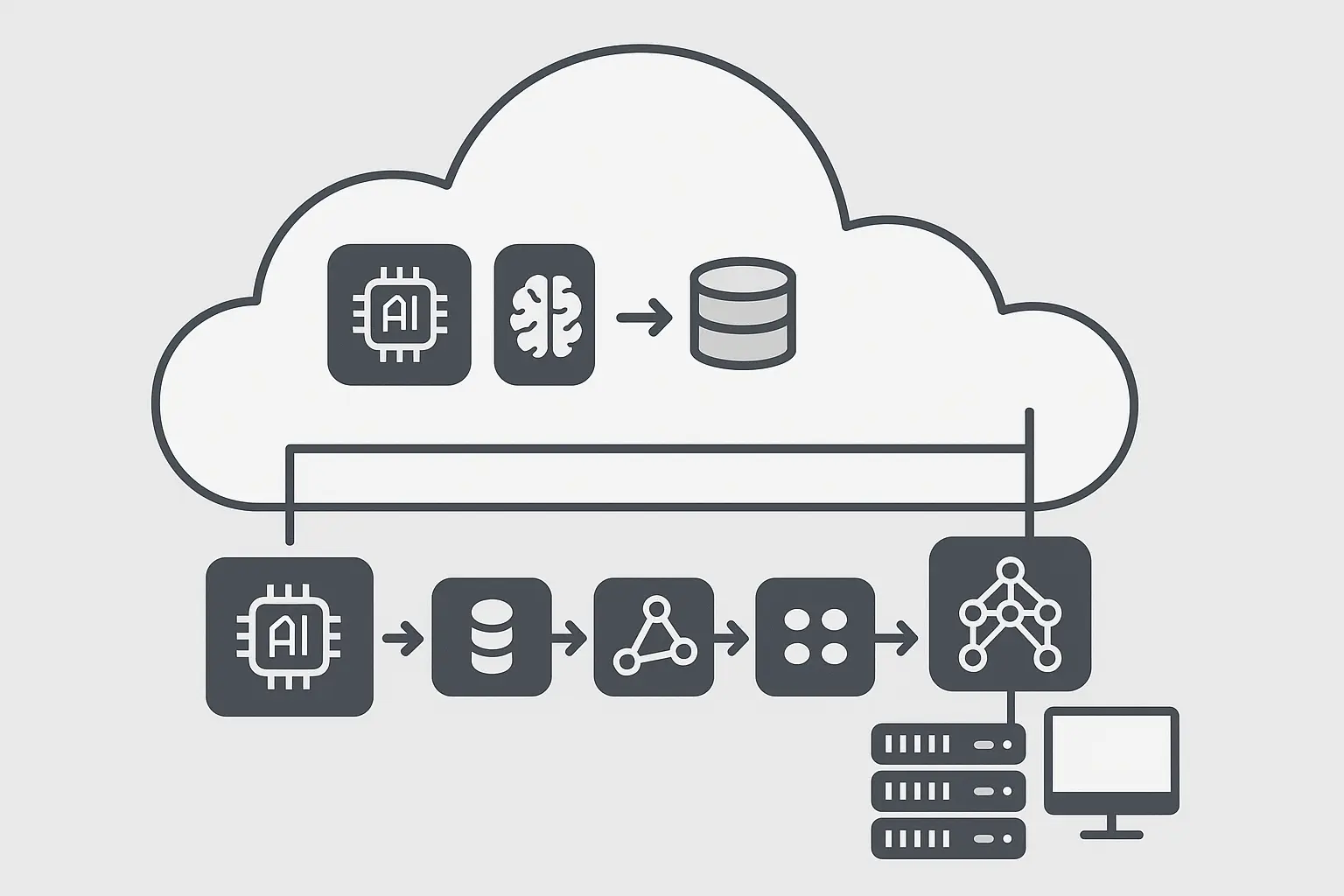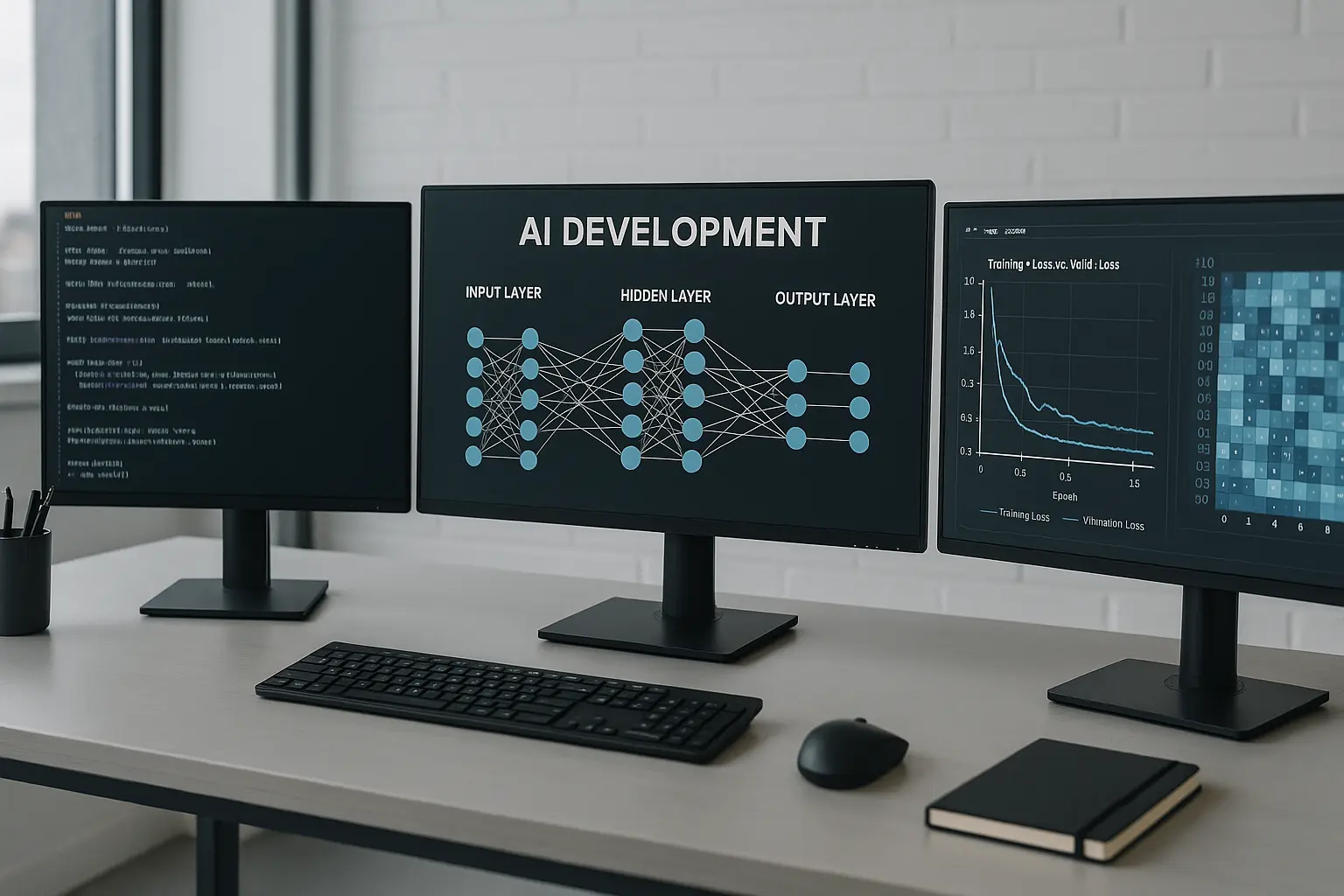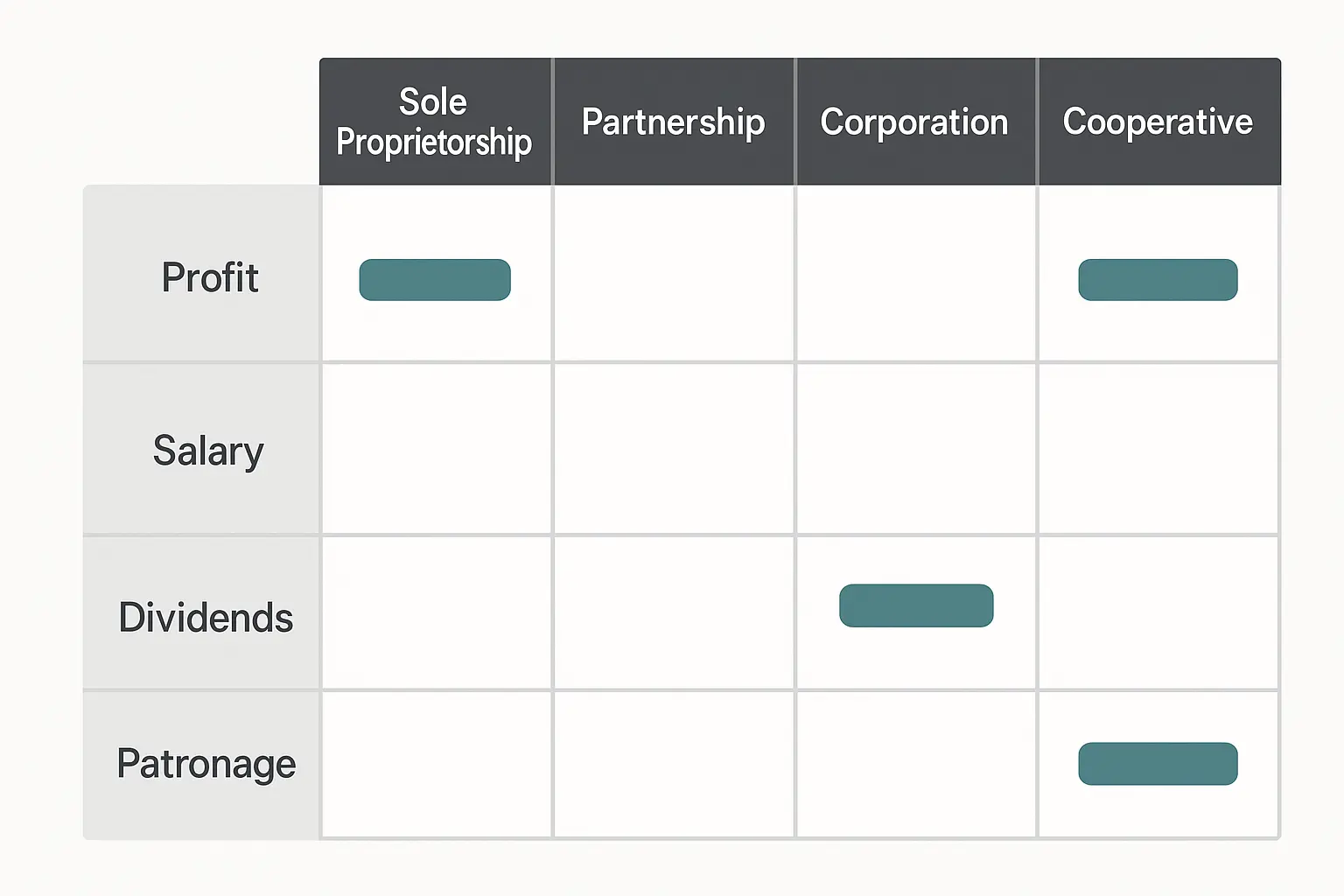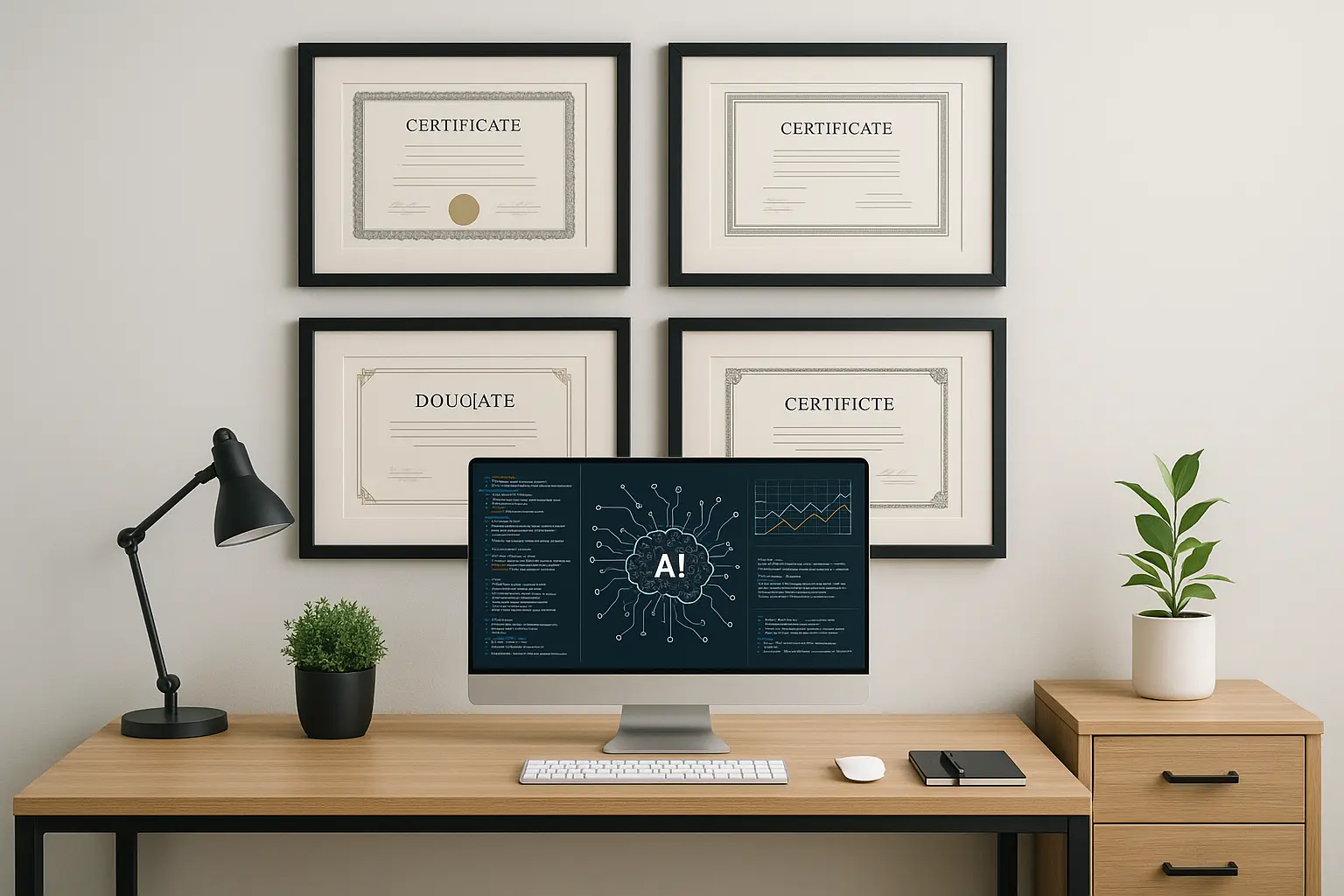Let me be straight with you about AI developer salaries. Yes, the money can be incredible. But the path there isn’t as simple as the headlines make it seem.
I’ve been working in AI for five years now, and I’ve seen friends go from $60K bootcamp grads to $200K+ engineers. I’ve also seen people get stuck in “AI” roles that are really just data entry with fancy titles.
Here’s what I wish someone had told me when I started: the salary depends way more on what you actually build than what’s on your resume.
According to recent industry data, the average total compensation of a ML / AI Software Engineer in United States is $244,000, highlighting the lucrative nature of this rapidly growing field. But that’s just the starting point – the real numbers get much more interesting when you dig deeper.
Table of Contents
- The Reality Check: What AI Developers Actually Earn
- What Actually Pays More (Skills That Matter)
- The Path That Works: Smart Career Moves
- Common Mistakes That Kill Your Earning Potential
- What’s Really Happening in the Market
- Your Action Plan
TL;DR
- Entry-level AI developers start around $90K-$120K, but the progression to senior roles can hit $400K+ in total compensation
- Geographic location matters, but remote work has created new arbitrage opportunities
- The highest earners combine AI skills with domain expertise in finance, healthcare, or other industries
- Job switching every 2-3 years typically results in 20-40% salary increases
- Building real projects that solve business problems matters more than collecting certifications
- Communication and business understanding become more important as you advance
- Total compensation packages (including equity and bonuses) can double your base salary at top companies
The Reality Check: What AI Developers Actually Earn
When people ask me about AI developer salaries, I always start with this: forget the $250 million headlines about top researchers. Those are outliers. Let’s talk about what real people actually make.
The truth is, there’s a massive range depending on what you actually do, where you work, and how good you are at the business side of things.
The Entry-Level Reality ($90K-$120K)
Fresh graduates and career switchers entering AI development can expect starting salaries between $90,000-$120,000. But here’s what the job boards don’t tell you: that range depends heavily on what you can actually demonstrate.
My friend Jake started as a frontend developer making $75K. He spent six months building a side project that used machine learning to predict housing prices. That project (not his computer science degree) got him interviews. Two years later, he’s making $165K at a fintech company, working on fraud detection systems.
The key? He could show real AI work, not just talk about it.
Most entry-level positions today include comprehensive benefits packages, learning stipends, and mentorship programs. You’re getting paid to learn some of the most valuable skills in tech. But don’t expect Silicon Valley numbers right out of college unless you’ve got something impressive to show.
Take Sarah, a recent computer science graduate who landed her first AI developer role at a mid-sized fintech company in Austin. Her base salary started at $95,000, but with signing bonus ($15,000), annual performance bonus (up to $12,000), and stock options valued at $8,000 annually, her total first-year compensation reached $130,000. Within 18 months, her proven ability to implement fraud detection algorithms earned her a promotion to $115,000 base salary.
The Mid-Level Sweet Spot ($130K-$200K)
This is where things get interesting. Developers with 3-5 years of AI experience command salaries between $130,000-$200,000, often including significant equity compensation and performance bonuses.
The mid-level range is where AI developers start seeing serious money. You’ve proven you can build and deploy real AI systems, not just toy projects from tutorials. Performance bonuses become substantial at this level (often $20K-$50K annually). Companies reward developers who can ship AI features that actually impact business metrics.
Here’s what I learned the hard way: staying loyal to one company will cost you money. My first AI job paid $95K. After two years of solid performance reviews and a “generous” 8% raise, I was making $103K. Then I interviewed elsewhere and got offers for $140K. When I told my boss, suddenly they could find budget for $125K to keep me.
The math is simple: companies budget 3-5% for annual raises but 20-30% for new hires. Every 2-3 years, test the market. Even if you don’t leave, you’ll know your worth.
Senior AI Developer Territory ($200K-$400K+)
Senior AI developers and technical leads earn $200,000-$400,000+ with total compensation packages often exceeding $500,000 when including stock options, bonuses, and benefits. These roles require deep technical expertise, leadership skills, and the ability to architect complex AI systems.
But here’s the reality: the highest-paid developers I know spend more time in meetings than in code. That’s not a bug, it’s a feature. As you advance, your job becomes less about writing perfect code and more about making good decisions about what to build.
Recent industry developments have pushed compensation to unprecedented levels. “Silicon Valley’s AI talent war just reached a compensation milestone that makes even the most legendary scientific achievements of the past look financially modest” Ars Technica reports, with companies like Meta offering individual AI researchers packages worth $250 million over four years.
This explosion reflects how critical these roles have become to company success, but don’t let it create unrealistic expectations for most positions.
Geographic Reality Check
Location still matters, but remote work has changed the game significantly.
| Location | Entry-Level Range | Mid-Level Range | Senior-Level Range | Cost of Living Factor |
|---|---|---|---|---|
| Silicon Valley, CA | $110K-$140K | $160K-$240K | $250K-$450K | Very High (+40-50%) |
| Seattle, WA | $100K-$130K | $150K-$220K | $230K-$400K | High (+25-35%) |
| Austin, TX | $85K-$115K | $130K-$190K | $200K-$350K | Moderate (+10-15%) |
| Denver, CO | $80K-$110K | $125K-$185K | $190K-$320K | Moderate (+10-20%) |
| Atlanta, GA | $75K-$105K | $120K-$175K | $180K-$300K | Low (+5-10%) |
Silicon Valley still pays the most in absolute terms – Bay Area AI developers earn 30-50% above national averages. But here’s the reality check: that $400K salary doesn’t go as far when you’re paying $4,000+ for a one-bedroom apartment.
Austin has become particularly attractive for AI developers. You can earn $200K+ while paying half the housing costs of San Francisco. Denver’s AI scene is exploding, especially in aerospace and energy applications. Atlanta’s fintech and healthcare AI sectors offer competitive salaries with Southern cost of living.
The remote work arbitrage won’t last forever, but if you’re strategic about timing and location, you can capture some of that value right now.
What Actually Pays More (Skills That Matter)
Forget the endless framework debates. Here’s what I’ve seen consistently lead to promotions and raises in the AI field.
Building Your “Unfair Advantage”
The highest-paid AI developers aren’t necessarily the smartest. They’re the ones who combine skills that are hard to find together.
Take my colleague Maria. She’s not the strongest programmer on our team, but she understands both machine learning and healthcare regulations. That combination makes her irreplaceable. She makes $240K because finding someone else with both skills is nearly impossible.
Some powerful combinations I’ve seen work:
- AI + domain expertise (finance, healthcare, manufacturing)
- Machine learning + mobile development
- Deep learning + edge computing
- AI + product sense (understanding what users actually want)
Don’t just collect random certifications. Build combinations that make you unique.
Technical Skills That Actually Move the Needle
Deep Learning Framework Mastery
Proficiency in specific deep learning frameworks can add 15-25% to base salaries, but here’s the thing: depth beats breadth every time.
I used to chase every new framework that came out. It’s exhausting and counterproductive. Instead, pick one or two areas and go deep. I know PyTorch really well, and that’s opened more doors than surface-level knowledge of ten different tools ever could.
PyTorch has become the dominant framework for AI research and increasingly for production. Deep expertise here opens doors at top AI companies. TensorFlow still rules enterprise deployments. If you can optimize TensorFlow models for production, you’re incredibly valuable.
Essential AI Framework Skills That Matter:
- PyTorch fundamentals and advanced optimization
- TensorFlow/Keras for production deployments
- Hugging Face Transformers for modern NLP
- Docker containerization for ML models
- Kubernetes for ML orchestration
- MLflow for experiment tracking
Cloud AI Platform Expertise
Expertise in AWS SageMaker, Google Cloud AI, or Azure ML platforms commands premium compensation due to enterprise demand for cloud-native AI solutions. Multi-cloud expertise commands the highest premiums because companies want flexibility.
Most production AI systems live in the cloud now. AWS SageMaker knowledge is particularly valuable because of AWS’s market dominance. Most enterprises are building their AI infrastructure there.
The Skills That Actually Matter for Career Growth
1. You can ship things that work
Half the AI projects I’ve seen never make it to production. If you can take a model from Jupyter notebook to serving millions of requests, you’re gold.
2. You understand the business
The developers making $300K+ don’t just build cool models. They build models that make money or save money. Learn to translate technical work into business impact.
3. You can explain complex things simply
If you can make a VP understand why your model is better than the existing system, you’ll advance faster than someone who can only talk to other engineers.
Specialized Roles That Command Premium Pay
MLOps Engineers ($150K-$250K)
MLOps engineers command premium salaries due to their expertise in scaling ML systems. These professionals bridge the gap between ML research and production systems, making them highly valuable to companies deploying AI at scale.
MLOps is where the rubber meets the road in AI development. You’re the person who makes research models actually work in production. The skill set combines DevOps expertise with deep ML knowledge. Not many people have both, which drives up compensation significantly.
Consider Marcus, an MLOps engineer at a Series B startup in San Francisco. His role involves managing the entire ML pipeline from data ingestion to model deployment using Kubernetes and MLflow. Starting at $180,000 base salary, his total compensation including equity and bonuses reaches $240,000 annually.
AI Research Scientists ($180K-$350K)
AI research scientists at companies like DeepMind, OpenAI, and major tech firms earn $180,000-$350,000+ with significant research bonuses and publication incentives. These roles focus on advancing the state of AI rather than implementing existing techniques.
Research scientist roles are the closest thing to academia within industry. You’re pushing the boundaries of what’s possible in AI. Publication bonuses can add substantial income – some companies pay $10K-$25K for papers published in top-tier conferences.
The competitive landscape for top AI research talent has intensified dramatically. “OpenAI told staff in recent days it is seeking ‘creative ways to recognise and reward top talent’ after losing key employees to rivals” according to the Australian Financial Review, highlighting how companies are scrambling to retain their best researchers.
Educational Background Impact
Advanced degrees can provide a salary boost, particularly early in your career. PhD holders in AI-related fields often command 20-40% higher starting salaries, particularly in research-oriented positions.
But here’s what I’ve observed: the PhD premium diminishes over time if you’re not in a research role. Industry experience becomes more valuable than academic credentials for most positions. The boost from advanced degrees is most pronounced early in your career.
Professional certifications from Google, AWS, or Microsoft can add $10,000-$25,000 to annual compensation, especially for mid-level developers. Cloud certifications are particularly valuable because they’re hard to fake. You either know how to architect ML systems on AWS or you don’t.
The Path That Works: Smart Career Moves
Look, I’m going to give you the advice I wish I’d gotten earlier in my career. Most “career growth” articles are fluff. Here’s what actually moves the needle on your paycheck.
Strategic Job Movement
The job-hopping reality is this: every 2-3 years, test the market
The job-hopping reality is this: every 2-3 years, test the market. Even if you don’t leave, you’ll know your worth. But here’s the catch – you can’t just job-hop randomly. Each move needs to add something to your story. Better tech stack, bigger scale, more responsibility. Otherwise, you look flaky.
When evaluating these compensation packages, many AI professionals find that having proper educational documentation becomes crucial for advancing their careers. Understanding whether it’s worth it to get a college degree can help you make informed decisions about the educational investments that will maximize your earning potential in artificial intelligence.
Career Track Options
Individual Contributor Track ($90K to $400K+ Journey)
The IC track allows developers to reach staff engineer or principal engineer levels earning $300,000-$400K+ while focusing purely on technical excellence and innovation. This path suits developers who prefer deep technical work over people management.
The progression typically takes 8-12 years, but the financial rewards are substantial. Principal engineers at top companies often out-earn many VPs. Senior ICs can command compensation packages rivaling executive roles.
Management Track Transition ($150K to $500K+ Potential)
Moving into engineering management or technical leadership roles can lead to compensation packages exceeding $500,000 at senior levels, combining base salary, bonuses, and equity.
Take David, who transitioned from senior AI engineer to engineering manager at a Series C startup. His base salary increased from $165,000 to $185,000, but his total compensation jumped from $220,000 to $320,000 due to increased equity grants and management bonuses. Within two years, his leadership in shipping three major ML features led to a promotion to Director of AI Engineering with $450,000 total compensation.
The Negotiation Game
Most developers are terrible at negotiating. I was too, until I realized companies expect it.
Here’s what changed everything for me: I started treating job interviews like product demos. Instead of just answering questions, I’d show them problems I could solve for them.
“I noticed your recommendation system probably struggles with cold start problems. At my last company, I built something that improved new user engagement by 23% using…”
Suddenly, salary negotiations became easier because they could see the value I’d bring.
AI Developer Salary Negotiation Strategy:
- Research current market rates for your role and location
- Document your specific AI achievements in business terms
- Gather competing offers or interview opportunities
- Calculate total compensation, not just base salary
- Practice negotiation conversations with trusted mentors
- Ask for time to consider offers rather than accepting immediately
Company Type Considerations
The type and size of company significantly impacts AI developer compensation, with different trade-offs between base salary, equity, job security, and growth opportunities.
| Company Type | Base Salary Range | Equity Potential | Job Security | Learning Opportunities |
|---|---|---|---|---|
| Big Tech (FAANG) | $200K-$400K+ | Moderate-High | Very High | Massive Scale Systems |
| AI-First Startups | $120K-$250K | Very High | Moderate | Cutting-Edge Research |
| Government/Academia | $80K-$150K | Very Low | Very High | Research Freedom |
Big tech companies offer stability and immediate high compensation. Your $300K total comp is pretty much guaranteed. Startups offer lottery tickets – your equity might be worth millions if the company succeeds, or nothing if it fails.
AI-first companies (like OpenAI, Anthropic) pay the highest premiums because AI developers are their core competitive advantage. Traditional enterprises implementing AI often pay less because AI is a cost center, not a profit center.
When transitioning between different company types, professionals often need to provide educational documentation quickly. Having academic transcripts readily available can accelerate the hiring process at top-tier AI companies.
Common Mistakes That Kill Your Earning Potential
I’ve watched talented developers plateau because of preventable mistakes. Don’t be one of them.
The “Shiny Object” Trap
Every few months, there’s a new AI framework or technique that’s going to “change everything.” I used to chase every trend. It’s exhausting and counterproductive.
Instead, pick one or two areas and go deep. Mastery of one framework opens more doors than surface-level knowledge of ten different tools. Focus on building expertise that compounds over time.
Underestimating the Importance of Communication
If meetings make you want to hide under your desk, work on that. Your career depends on it. The highest-paid AI developers I know understand that technical excellence alone isn’t enough.
As you advance, your job becomes less about writing perfect code and more about making good decisions about what to build. That requires talking to people, understanding requirements, and influencing technical direction.
Ignoring the Business Side
I used to think caring about revenue and profit margins was “selling out.” That was naive.
Companies pay AI developers well because AI can make them money. If you understand how your work connects to business outcomes, you become more valuable. Period.
Read your company’s financial reports. Understand how your team’s work affects key metrics. “Improved model accuracy by 12%” is okay. “Reduced customer churn by 12%, saving $2.3M annually” is better.
Not Building a Portfolio of Real Work
Half the AI developers I interview can talk about algorithms but can’t show me anything they’ve built that works in the real world. Build one impressive project that solves a real problem. Not a tutorial, not a toy dataset. Something that demonstrates you can go from idea to working system.
What’s Really Happening in the Market
Let me give you the unvarnished truth about where AI salaries are heading.
The Bubble Question
Are AI developer salaries in a bubble? Honestly, some probably are. When companies are paying $250 million for individual researchers, something’s got to give eventually.
But here’s what I think happens: the crazy top-end salaries might cool down, but solid AI engineering skills will remain valuable. The companies throwing around millions are the exception, not the rule.
Focus on building skills that will matter in five years, not just riding the current wave.
Where the Real Opportunities Are
Everyone’s focused on the sexy stuff – large language models, generative AI, autonomous vehicles. But some of the best opportunities are in “boring” applications.
Optimizing supply chains with machine learning. Building better fraud detection systems. Improving medical diagnoses. These problems have clear business value and less competition than the headline-grabbing areas.
The AI pay in these domains is often more stable and predictable than the cutting-edge research roles that get all the attention.
Market Saturation Concerns
Some areas of AI development are becoming saturated. Basic data science roles that were hot five years ago now have intense competition. The key is staying ahead of the curve and building skills in emerging areas before they become commoditized.
Areas I’m watching for future growth:
- AI safety and alignment
- Edge AI and mobile optimization
- AI for climate and sustainability applications
- Specialized AI for regulated industries
Your Action Plan
Enough theory. Here’s what you should actually do based on where you are in your career.
If You’re Just Starting Out
1. Build one impressive project that solves a real problem. Make it something you can demo in an interview that shows end-to-end thinking.
2. Pick a domain where you can develop expertise alongside your technical skills. Healthcare, finance, retail – doesn’t matter which one, but pick one and go deep.
3. Start interviewing even if you’re happy where you are. You need to understand your market value and practice talking about your work.
4. Focus on fundamentals over trendy frameworks. Understanding machine learning principles will serve you better than knowing the latest library.
If You’re Mid-Career
1. Document your impact in business terms. Keep a running list of how your work has affected key business metrics.
2. Build your network intentionally. Go to meetups, contribute to open source, write about what you’re learning. The best opportunities come through connections.
3. Consider the management track if you enjoy mentoring and strategy. The compensation ceiling is higher, even if the day-to-day work is different.
4. Test the market every 2-3 years. You don’t have to leave, but you should know what you’re worth.
If You’re Senior
1. Think about your legacy. What do you want to be known for? Start building toward that reputation.
2. Mentor others. It’s not just good karma – it builds your network and leadership skills.
3. Stay technical enough to maintain credibility, but focus more on strategy and architecture decisions.
4. Consider equity-heavy opportunities if you can afford the risk. Senior roles at the right startup can be life-changing financially.
For professionals looking to advance their careers, understanding the educational landscape becomes crucial. Many find that replacing a lost diploma or obtaining backup copies of their credentials helps them move quickly when new opportunities arise in this fast-paced field.
How ValidGrad Supports Your AI Career Journey
While pursuing a lucrative AI development career, having proper documentation of your educational achievements becomes crucial for job applications and career advancement. Many AI professionals find themselves needing replacement diplomas or transcripts due to loss, damage, or the need for backup copies when applying to multiple high-paying positions.
ValidGrad provides a reliable solution for AI developers who need educational document replacements. Whether you’re transitioning between companies or advancing to senior roles, having clean, professional copies of your documents ensures you’re never delayed in the application process when pursuing those $200K+ opportunities.
For AI professionals who need to quickly provide educational documentation, understanding how to get a college diploma replacement can prevent delays in the application process for high-paying positions.
Ready to secure backup copies of your educational credentials? Visit ValidGrad today and ensure your documents are never a roadblock to your next AI career opportunity.
The Bottom Line
AI developer salaries are great, but they’re not guaranteed. The field is evolving fast, and what works today might not work tomorrow.
The artificial intelligence salary landscape offers some of the most compelling compensation opportunities in tech, but success requires strategic thinking beyond just learning to code. From entry-level positions starting around $90K to senior roles exceeding $400K in total compensation, the financial rewards reflect the critical importance of AI skills in today’s economy.
Focus on building real skills, understanding business value, and positioning yourself strategically. The money will follow.
And remember – salary is just one part of career satisfaction. I’ve seen people chase the highest offer only to end up miserable. Make sure you’re optimizing for the right things.
What strikes me most about this field is how quickly things change. The skills that command premium salaries today might be commoditized in two years, while entirely new specializations emerge. Staying adaptable and continuously learning isn’t just career advice – it’s essential for maintaining your earning potential in AI development.
As you progress in your AI career, maintaining proper documentation of your achievements becomes increasingly important. Whether you need replacement diplomas for career transitions or want to understand different types of degrees that can enhance your AI credentials, having the right educational foundation supports your long-term earning potential.
The AI boom has created incredible opportunities. But like any boom, it rewards people who are thoughtful and strategic, not just those who show up. Whether you choose the individual contributor track focusing on technical excellence or transition into management roles, the financial ceiling in AI development continues rising.
The companies building the future of artificial intelligence need talented developers, and they’re willing to pay accordingly. Your job is to position yourself strategically to capture these opportunities.
What’s your next move going to be?
